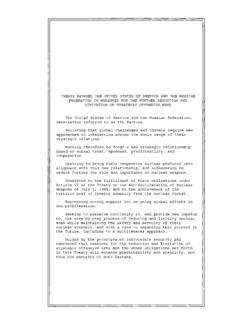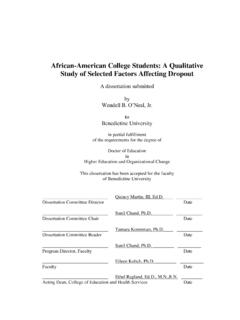Transcription of INDEPENDENCE - United States Department of State
1 Americans value INDEPENDENCE and self-determination, placing importance on the role of the individual in shaping his or her own identity and destiny through one s choices, abilities, and efforts. INDEPENDENCE fosters one s ability to be self-reliant and self-sufficient, to be able to do what is necessary to create a fulfilling life for oneself and one s family. For Americans, INDEPENDENCE is a prime motivator for self-determination, reflected in the bravery of the early colonists and those who marched westward to create new lives, homes, and communities. Various freedoms are also guaranteed in the Bill of Rights, the first ten amendments to the Constitution. The First Amendment guarantees the freedoms of religion, speech, assembly, and the press. The Fourth Amendment prevents unreasonable searches and seizures, that is, the government cannot, without reason, enter your home or seize financial or computer records.
2 INDEPENDENCE , also called freedom or liberty, also represents the limited intervention and control of the government on personal lives. This notion of INDEPENDENCE comes directly from the Declaration of INDEPENDENCE . Millions of immigrants have come to the Land of Opportunity to help their families and to flee war,persecution, poverty, and social obligations and restrictions. Many others come because they want to pursue their own American Dream whether that is education, starting a business, or leading their own self-created choice is visible in many aspects of American life. At home, American parents teach their children self-sufficiency by encouraging them to feed and dress themselves from a very early age. In the workplace, employees must forge their own career paths and not depend on a paternalistic sponsor who will pave the public life, citizens are free to vote for their candidates of choice and to voice their pleasure or disagreement to their elected officials or to participate in mass demonstrations.
3 In their private lives, Americans are free to live where they wish, socialize with whom they select, and practice their chosen religion. In summary, this notion of INDEPENDENCE creates the opportunities for people to determine their own lifestyles free from government control and social conventions. SO YOU RE AN AMERICAN? : A GUIDE TO ANSWERING DIFFICULT QUESTIONS ABROAD1 INDEPENDENCE 02: CULTUREThe belief that all humans are created equal and are equal in value, without regard to their gender, race, ethnicity, religion, age, disability, or sexual orientation, has influenced national political movements and local community action groups. Treat others as you would like to be treated and Love your neighbor as yourself are proverbs that encourage people to deal with others in a fair and kind manner.
4 In public life, this value is embodied by the commitment to providing and enforcing the equality of opportunity; access to goods and services; and equal rights, representation, and protection under the law. In private interactions, average citizens do not look to the upper classes to determine societal norms but rather determine their own guidelines. While Americans show respect to their hierarchical superiors, they do not give up their ability to express their opinions or assert their notion of egalitarianism also originates from Thomas Jefferson s quote in the Declaration of INDEPENDENCE , stating all men are created equal. Most historians believe that Jefferson, influenced by the European Enlightenment, meant humanity when he wrote this, but others believe that he did mean to exclude women, children, and slaves.
5 Jefferson himself owned slaves, as did many of the Founding Fathers. Two centuries later, the Civil Rights movement of the 1960s, led by Dr. Martin Luther King, Jr., and others, worked to end racial segregation and discrimination against african Americans. The accomplishments of civil rights leaders paved the way for women, people with disabilities, and the LGBT community to also fight for equal rights and representation in subsequent decades. While certainly perfect social, economic, educational, and legal equality doesn t exist in the United States , or in any other country, the ideal of equality still resonates strongly with most Americans and exerts a strong pull for immigrants to come to the United States . In the last 50 years, many disadvantaged groups have made strides.
6 In general terms, african Americans have made significant economic and educational gains. There are more women in elected office and in upper management than ever before. Hispanics are coalescing to have a greater political voice and to push for immigration reform. In legal terms, the passage of the Americans with Disabilities Act (ADA) in 1990 aimed to prevent discrimination and guarantee access and accommodation for those with disabilities. In June 2015 the Supreme Court allowed and protected same-sex marriage nationwide. Even with these changes, most Americans would agree there is much room for improvement in creating a more egalitarian Civil Rights Act of 1964 legislated three things: it banned discrimination based on race, color, religion, sex, or national origin in employment practices; it ended unequal application of voter registration requirements; and it rendered illegal racial segregation in schools, at the workplace, and in public accommodations.
7 SO YOU RE AN AMERICAN? : A GUIDE TO ANSWERING DIFFICULT QUESTIONS ABROAD2 EQUALITYAMERICAN VALUES Individualism, or individual will, means each person is free to do what they want and need, as long as it doesn t interfere with the rights of others. Competition is inherent in individualism as people strive to be recognized and rewarded. Americans also believe that they have a fair degree of control over their lives; that their actions can change or influence their circumstances. They value privacy and determine with whom they will share the intimate details of their lives. Individual Americans might not see themselves as representative of American culture, but rather perceive themselves as people with unique behaviors, values, and social value of individualism was described and promoted by the 17th century British Enlightenment philosopher John Locke, who greatly influenced the work of the Founding Fathers, and by John Stuart Mill, the 19th century British philosopher, who influenced the flourishing of the new nation.
8 These thinkers advocated the individual pursuit of work and satisfaction as well as the limitation of government to intervene in individuals lives. This, they assumed, would be accompanied by a desire to contribute to the common and public individualistic culture allows and encourages people to create their own lifestyle that they hope will lead to happiness and accomplishments. Their self-expression is not obligated to conform to societal norms or follow in their parents footsteps. Students are mostly graded for their individual work. Entertainment figures and sports icons are celebrated for their unique contributions. American entrepreneurs have generated many innovations and jobs by their vision and critics, on the other hand, point out that our focus on me has eroded the we concept needed for community cohesion.
9 Research from the 2000 book Bowling Alone by Robert D. Putnam showed that Americans belong to fewer organizations such as unions, Boy and Girl Scouts, and Rotary Clubs, and socialize less frequently with family, friends, and neighbors than they had in the past. As such, they are becoming lonelier and more isolated, much to the deterioration of the social fabric of communities. SO YOU RE AN AMERICAN? : A GUIDE TO ANSWERING DIFFICULT QUESTIONS ABROAD3 INDIVIDUALISM 02: CULTUREThe United States enjoys a democratic form of government where citizens elect and change their political leaders, whom they expect will represent them and answer to their will. At the basic level, popular opinion decrees that a democratic nation must have free and fair elections, a system of checks and balances, rule by the majority, and protection of minorities.
10 American democracy grew from ancient Greek traditions, the Bible, and ancient Israel as well as British forms of government. John Locke, the British philosopher, rejected the idea that kings had a divine right to rule but rather believed that people are the source of power. Thomas Jefferson drew heavily from Locke s Constitution, adopted in 1788, created an outline for a modern democracy. The Bill of Rights, containing the first ten amendments to the Constitution and adopted in 1791, describes the limits on government power and grants certain rights to the States and to individuals. Democratic traditions are carried out by individual citizens as well as by the federal government. For all federal and most State elections, a voter must be a citizen, 18 years of age, and a resident of the locality where they will vote.

















